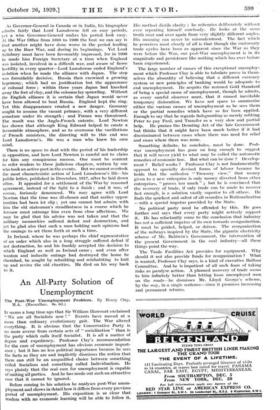An All-Party Solution of Unemployment
The Post-War Unemployment Problem. By Henry Clay, M.A. (Macmillan. 8s. 6d.)
IT seems a long time ago that Sir William Harcourt exclaimed "We are all Socialists now ! " Events have moved at a more than ordinary evolutionary gait. The War altered everything. It is obvious that the Conservative Party is no more averse from certain acts of " socialization " than is the party which calls itself Socialist. It is all a matter of degree and expediency. Professor Clay's recommendation for the cure of unemployment has obvious economic import- ance; but it has no less political importance because he sees the facts as they are and implicitly dismisses the notion that there can still be an unqualified choice between something called Socialism and something called Individualism. He says plainly that the real cure for unemployment is capable of uniting all parties. And he has made out such an attractive case that it cannot be ignored.
Before coming to his solution he analyses post-War unem- ployment and shows in detail how it differs from every previous Period of unemployment. His exposition is so clear that readers with no economic learning will be able to follow at.
His method distils clarity ; he reiterates deliberately without ever repeating himself carelessly. He looks at the same truth over and over again from very slightly different angles. His meaning can never be misunderstood. The fact which he perceives most clearly of all is that though the customary trade cycles have been as apparent since the War as they were before the War, our post-War unemployment is in its magnitude and persistence like nothing which has ever before been experienced.
The large number of causes of this exceptional unemploy- ment which Professor Clay is able to tabulate prove in them- selves the absurdity of believing that a different currency system or new principles of banking would be adequate to end unemployment. He acquits the restored Gold Standard of being a special cause of unemployment, though he admits, as every careful observer must, that it caused inevitable temporary dislocation. We have not space to summarize either the various causes of unemployment as he sees them or the partial remedies which have so far been applied. Enough to say that he regards Safeguarding as merely robbing Peter to pay Paul, and Transfer as a very slow and partial help. He praises the Derating Act of the late Government but thinks that it might have been much better if it had discriminated between cases where there was need for relief and cases where there was none.
Something definite, he concludes, must be done. Post- war unemployment has gone on long enough to suggest that it will never yield to what may be called the automatic remedies of economic law. But what can be done ? Develop- ment? Relief works ? Professor Clay is not fundamentally opposed to specially devised forms of labour because he holds that the orthodox "Treasury view," that money given to a new enterprise is only money diverted from other enterprises, "proves too much" ;_ but he is convinced that the recovery of trade, if only trade car. be made to recover fast enough, is a solution vastly superior to all others. He finds the quickest and safest of all remedies in Rationalization —with a special impetus provided by the State.
No political party need be offended by this. He goes further and says that every party might actively support it. He has reluctantly come to the conclusion that industry has not a sufficient impetus of its own towards reorganization. It must be guided, helped, or driven. The reorganization of the railways inspired by the State, the gigantic electricity scheme of Mr. 13aldwin's Government, the intervention of the present Government in the coal industry—all these things point the way.
The Trade Facilities Act provides for equipment. Why should it not also provide funds for reorganization ? What is wanted, Professor Clay says, is a kind of executive Balfour Committee. And he is impatient of all such fears of taking risks as paralyse action. A planned recovery of trade seems to him infinitely better than letting loose unemployed men on the roads—he dismisses Mr. Lloyd George's scheme, by the way, in a single sentence—since it promises increasing and permanent returns.


















































 Previous page
Previous page